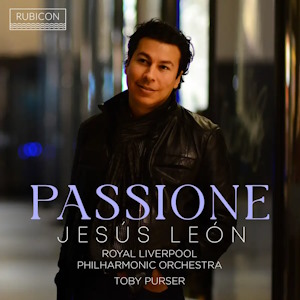
Passione
Jésus Léon (tenor & guitar)
Royal Liverpool Philharmonic Orchestra/Toby Purser
rec. 2022, Liverpool Philharmonic Hall, UK
No texts and translations
Reviewed as WAV 44.1 kHz, 16 bit download
Rubicon RCD1122 [54]
The Mexican tenor Jésus Léon made his stage debut in L’elisir d’amore in 2004 and has since then sung more than fifty roles around the world. He has a virile voice with easily produced brilliant top notes, but is also capable of scaling down his instrument to soft, intimate and nuanced singing. He excels in both capacities in this recital of popular songs in what could roughly be likened to Neapolitan songs – a repertoire that most tenors have devoted themselves to, from Caruso and onwards – but Léon throws his net wider and choses Spanish and Latin American songs as well. Many of the songs are well-known, but there are also rarities and relatively recent compositions.
The arrangers are unknown to me, apart from Giancarlo Chiaramello, who is an old hand and cooperated with Pavarotti during his heydays. León also contributes with one arrangement of his own, Amaneci otra vez, (track 2) where he also plays the guitar. This is one of the best tracks, and here he employs his seductive half voice to good effect. The song is of relatively recent date. Better known is the opening number, Bésame mucho, by the Mexican composer Consuelo Velázquez. She was only sixteen when she wrote the song in 1932 – and had herself never been kissed! – but the song became enormously popular – the most recorded song in Spanish ever, in fact. Léon’s lyrical singing here is again very appealing. His forte singing is convincing, but his tone hardens somewhat when under pressure. That is also obvious in another evergreen, Lacalle’s Amapola, composed in 1920. It was recorded in 1925 by the great Spanish tenor Miguel Fleta, and in the 1930s by Lecuona Cuban Boys. I remember it from my early years as a jazz digger, from a 1941 recording with Jimmy Dorsey, which was a best seller, but hundreds of others have recorded it, including Spike Jones and his City Slickers. The orchestration here is Mantovani-sweet, and the singing likewise.
Nino Rota wrote the music for Fellini’s La strada (1954), and the love theme, borrowed from Dvorak’s string serenade, played in the film on trumpet, also became a classic – as did the movie – so popular that La Scala made a ballet version of the film which was premiered in 1966 and was a great success, and frequently performed. I had the great fortune to see it in the vast Arena di Verona in 1989 with the original Gelsomina, Carla Fracci, still in marvellous shape, 23 years after the premiere. Both the dancing and Rota’s music were magical. Hearing the main theme sung by Jésus Léon evokes memories of both the film and the ballet.
Adolfo Guzmán was a new name to me, but I liked Te spore en la eternidad – it is a beautiful song, well worth returning to. Lara’s Granada has been bawled to pieces through the years, and I was positively surprised when Léon began it softly, but as it developed he gradually increased the volume – not exactly bawling; he isn’t that kind of singer – but he fell into the trap. No one can deny that there is brilliance in his tone. More moderate singing followed in Tosti’s ‘A vucchella, Santa Lucia Luntana was caressed, and likewise Freire’s Ay, Ay, Ay, a song that the young Jussi Björling also sang – but in Swedish of course. Cielito lindo follows attacca, vital with a glowing finale. José Serrano was one of leading composers of Zarzuelas during the beginning of the 20th century, but here he is represented by an aria from the opera El trust de los tenorios – a lively and enthusiastic piece that I can’t remember hearing before. Tosti again with one of his very best songs, Non t’amo più, sung here with great feeling. The title song, Passione, is suitably passionate. Buzzi-Peccata’s Lolita is another good friend, while father and son Morricone offer some film music, from Cinema Paradiso – soft and beautiful. The parade closes with another great Italian song: De Curtis’ Non ti scordar di me.
The programme is a mix of well-known and unhackneyed songs. The playing of the Liverpool Philharmonic is as expected first class, and the singing is agreeable. Anyone with a taste for this repertoire can safely invest in this disc.
Göran Forsling
Buying this recording via a link below generates revenue for MWI, which helps the site remain free


Contents
Consuelo Velázquez 1916–2005
1 Bésame mucho
José Alfredo Jiménez 1926–1973
2 Amanecí otra vez
Joseph Lacalle 1859–1937
3 Amapola
Nino Rota 1911–1979
4 “Love Theme” from the film La strada
Adolfo Guzmán 1920–1976
5 Te espero en la eternidad
Agustín Lara 1897–1970
6 Granada
Paolo Tosti 1846–1916
7 ’A vucchella
E.A. Mario 1884–1961
8 Santa Lucia luntana
Osmán Pérez Freire 1880–1930
9 Ay, Ay, Ay
Quirino Mendoza y Cortés 1862–1957
10 Cielito lindo
José Serrano 1873–1941
11 Te quiero, morena
from the opera El trust de los tenorios
Paolo Tosti
12 Non t’amo più
Ernesto Tagliaferri 1889–1937 & Nicola Valente 1881–1946
13 Passione
Arturo Buzzi-Peccia 1854–1943
14 Lolita
Andrea b.1964 & Ennio Morricone 1928–2020
15 “Se” from the film Cinema Paradiso
Ernesto De Curtis 1875–1937
16 Non ti scordar di me
Arranged by Peter Hope (1, 3, 4–6, 8, 11, 13, 15); Jesús León (2); Giancarlo Chiaramello (7, 12, 14, 16); Toby Purser (9, 10)

















